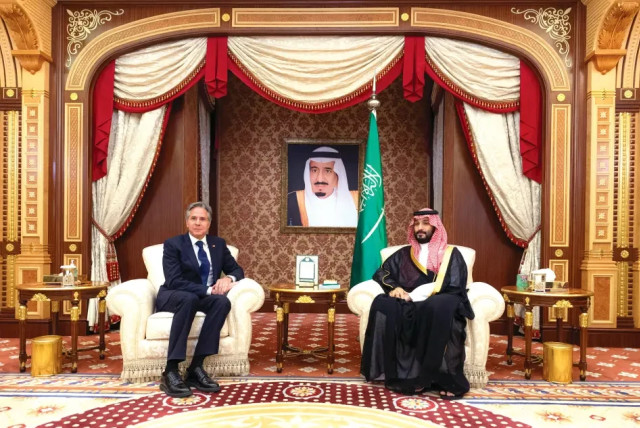Saudi-US bilateral accords 'not that connected' to Israel normalization, Riyadh says

Potential US-Saudi agreements about trade and artificial intelligence are "not tied to any third parties" and "can progress probably quite quickly," Prince Al Saud said.
Saudi Arabia's foreign minister said on Thursday that some of the bilateral agreements the kingdom has been negotiating with Washington are "not that tied" to the normalization of Saudi relations with Israel and are "moving ahead."
Potential US-Saudi agreements about trade and artificial intelligence are "not tied to any third parties" and "can progress probably quite quickly," Prince Faisal bin Farhan Al Saud said on stage at an investment conference in the Saudi capital, Riyadh.
"Some of the more significant defense cooperation agreements are much more complicated. We would certainly welcome an opportunity to finish them before the (end of the Biden) administration's term, but that's reliant on other factors outside of our control," he said.
"The other work streams are not that connected, and some of them are progressing quite quickly, and we hope to see moving forward."
Potential agreements
Saudi Arabia and the US are looking into a set of agreements on nuclear energy, security and defense cooperation, which were originally all part of a wider normalization deal with Riyadh and Israel.
US President Joe Biden’s aides originally envisioned, in three-way negotiations before the Oct. 7 attack, for Saudi Arabia to gain U.S. security commitments and U.S. nuclear cooperation in exchange for normalizing ties with Israel.
US Secretary of State Antony Blinken had said in May that Washington and Riyadh were close to concluding a set of agreements but cautioned that for normalization to proceed, there must be calm in Gaza and a path to Palestinian statehood.
Prince Faisal on Thursday reiterated the kingdom's position that it would not recognize Israel without a Palestinian state, adding on that accord, Saudi Arabia is "quite happy to wait until the situation is amenable," before moving ahead with normalization.
Jerusalem Post Store
`; document.getElementById("linkPremium").innerHTML = cont; var divWithLink = document.getElementById("premium-link"); if (divWithLink !== null && divWithLink !== 'undefined') { divWithLink.style.border = "solid 1px #cb0f3e"; divWithLink.style.textAlign = "center"; divWithLink.style.marginBottom = "15px"; divWithLink.style.marginTop = "15px"; divWithLink.style.width = "100%"; divWithLink.style.backgroundColor = "#122952"; divWithLink.style.color = "#ffffff"; divWithLink.style.lineHeight = "1.5"; } } (function (v, i) { });

